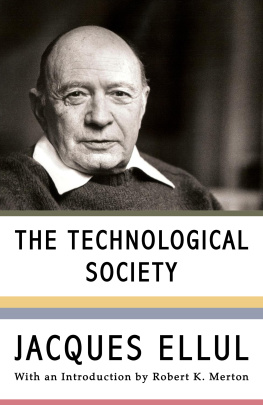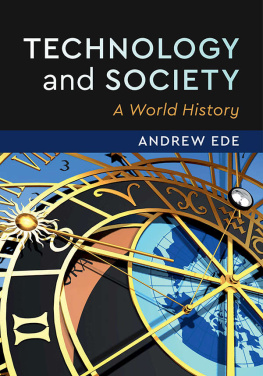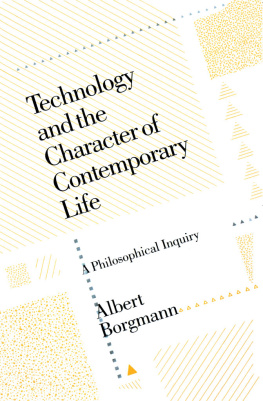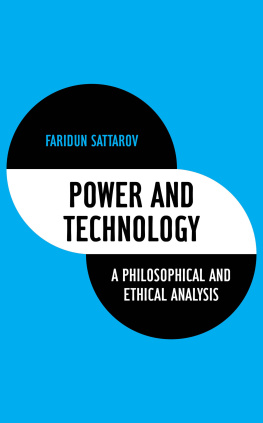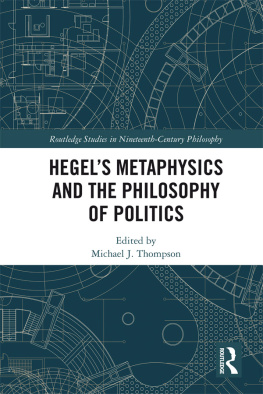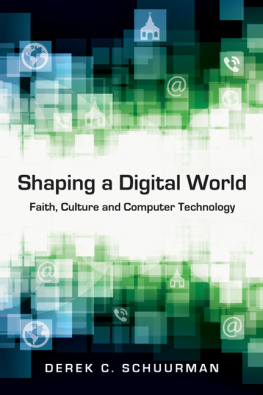As with any such work, many people contributed directly or indirectly tomaking it a reality. A few, however, deserve special mention. AdamBriggle offered early support and commentary and helped get this projectoff the ground. Ken Brady has been a long-time colleague and providedvarious insightful comments and feedback. Special thanks to my wifeLynn, who gave assistance and advice throughout. And finally, HenrykSkolimowski, who first prompted me to think critically about technology.
Introduction
An ambitious philosophy of technology has to be ontological, i.e., ithas to trace technology in the very fabric of reality.
Albert Borgmann
My mission in this book is simply stated: to undertake a philosophicalinvestigation of the metaphysics of technology. This is assuredly anambitious task. To this end, I begin with an astonishingly cleanslate. Essays and articles on the subject are extremely rare. Scholarly,book-length works are virtually nonexistent. It is not far from the markto state that this is the first monograph ever written on themetaphysics of technology.
And this is the first of many problems of technology.
The absence of such work is perhaps initially surprisingthough uponreflection, less so. At least since the 1920s, professional philosophershave by and large eschewed metaphysical speculations. Analyticphilosophy, based on formalisms, logic, and linguistic analysis, foundno need for classic metaphysics; it viewed it as largely detrimental toclear and rigorous thought. Analytic philosophy was, above all,scientific, and the 20th century was assuredly a scientificcentury, at least for those of us in the industrialized nations. Sciencewas seen as virtually synonymous with progress; in the same way, scientific,analytic philosophy was the way of progress in its own sphere.
Metaphysics, for its part, did not entirely vanish. It survived, but inthoroughly analytical form. Today we commonly speak of it in terms offormal ontology; it is reduced to dealing with highly abstract topicsrelated to universals and particulars, modalities, individuation,persistence, and time. Intensive focus is placed on the meanings ofvarious designations: relation, property, event, proposition, state. Asa consequence, the larger classic metaphysical questions have fallenaway. Metaphysics today has little relation to the real world, thelived world.
The 20th century was also self-evidently a technological century.Technological advances mirrored or exceeded those of science. In apragmatic sense, it was technology that had the greater impact uponhumanity and the planet. When the past century began, we were stillunable to create a functional flying machine; we rode in horse-drawncarriages and read by candlelight. The century ended withmicrocomputers, cell phones, nanotechnology, atomic weapons, spaceflight, and the Internet. One can hardly imagine a greater set ofsocial, psychological, or environmental changes occurring in what was,in principle, the lifespan of a single human being.
Technology thus rightly came under philosophic scrutiny, but it waslargely a philosophy that was analytically and scientifically oriented.This had at least two effects. One was that philosophers wereand stillarepredisposed to be uncritical of the phenomenon, or at least highlyrestrained in their critiques. Analytical philosophy is not normative;it does not pass judgment, and it does not proscribe courses of action.
Second, metaphysics as formal ontology hadand still hasvirtuallynothing to say about technology; the subject was nearly avoidedaltogether. Consequently, there is a fair body of research on thephilosophy of technology but virtually nothing on the metaphysics oftechnology. Even a cursory examination bears this out. A search of themain library catalog at my home institution, the University of Michigan,for English-language books on philosophy of technology published since1900 gives a result of 675 entries. The same search on metaphysics oftechnology yields four.
Now, this is not to imply that there has been no work done on the topicat hand. There hasmuch of it in the form of essays or short articles bycontinental philosophers. The standout example, of course, is MartinHeidegger. Many others have touched on metaphysical themes but have notexplored them in depth, certainly not in a book-lengthtreatment. But the technical phenomenon hasimposed itself upon us now to a sufficient degree that we can hardlyavoid dealing with it on a metaphysical plane. It is too pervasive, tooimportant, and potentially too dangerous to neglect any further.
On the other hand, a survey of the literature on the philosophy oftechnology finds many writers who, oddly, are not philosophers at all.They have little or no training in the field, and yet have come todominate the discourse. A representative sampling, reaching back to the1970s, would include the following:
Political scientists: L. Thiele (Indras Net and the Midas Touch, 2011), R. Sclove (Democracy and Technology, 1995), and L. Winner (The Whale and the Reactor, 1986; Autonomous Technology, 1977).
Economists: B. Arthur (The Nature of Technology, 2009), J. Mander (Four Arguments for the Elimination of Television, 1978), and E. F. Schumacher (Small Is Beautiful, 1973).
Historians: D. Nye (Technology Matters, 2006), R. Williams (Retooling, 2002), A. Pacey (Meaning in Technology, 1999), Smith and Marx (Does Technology Drive History?, 1994), and T. Roszak (Where the Wasteland Ends, 1972).
Sociologists: M. Sturken et al. (Technological Visions, 2004), and D. Cecchetto (Humanesis, 2013).
Journalists: R. Rhodes (Visions of Technology, 1999), K. Kelly (What Technology Wants, 2010), and D. Rushkoff (Present Shock, 2013).
Scientists: R. Kurzweil (The Age of Spiritual Machines, 1999; The Singularity is Near, 2005), and J. Kizza (Ethical and Social Issues in the Information Age, 2013).
Perhaps the most striking recent example is Kevin Kellys WhatTechnology Wants (2010). Kelly is a college dropout with no formaltraining in any academic field, and yet is somehow viewed as among themore prominent spokesmen in the philosophy oftechnology.
I do not mean to dismiss such interdisciplinary efforts; in fact, Istrongly encourage them. All these books make valid insights andimportant contributions, but all are necessarily deficient inphilosophical analysis. The authors lack the requisite philosophicalhistory and context, and are only minimally aware of the largermetaphysical issues at hand. As one measure of this, the books mentionedcontain almost no discussion of either Heidegger or Jacques Ellul, thetwo standard-bearers. None addressmetaphysicsthat is, the underlying nature or essence of thetechnological phenomenonin any meaningful way.
I would also add that, on the whole, philosophers have never feltcomfortable addressing technology. As with the common man, the subjectis largely inscrutable to most of them. They have neither the technicalnor the practical training required to understand it at more than thelevel of the average user. Rare is the philosopher today who comes tohis discipline via a path of scientific or mathematical training, letalone engineering or computer science. As aresult, technology is, for the contemporary philosopher, by and large,little more than a set of tools with which to research, live, andinteract. Like the typical consumer, philosophers primarily see itsbenefitsfaster and better ways to research, write, and exchange ideas.It aids them in their profession, and they profit thereby. Technology isessential to their universities and research centers. Their students areimmersed in it from earliest childhood. And despite the periodic hasslesand expense, it is generally convenient, reliable, and fun.





